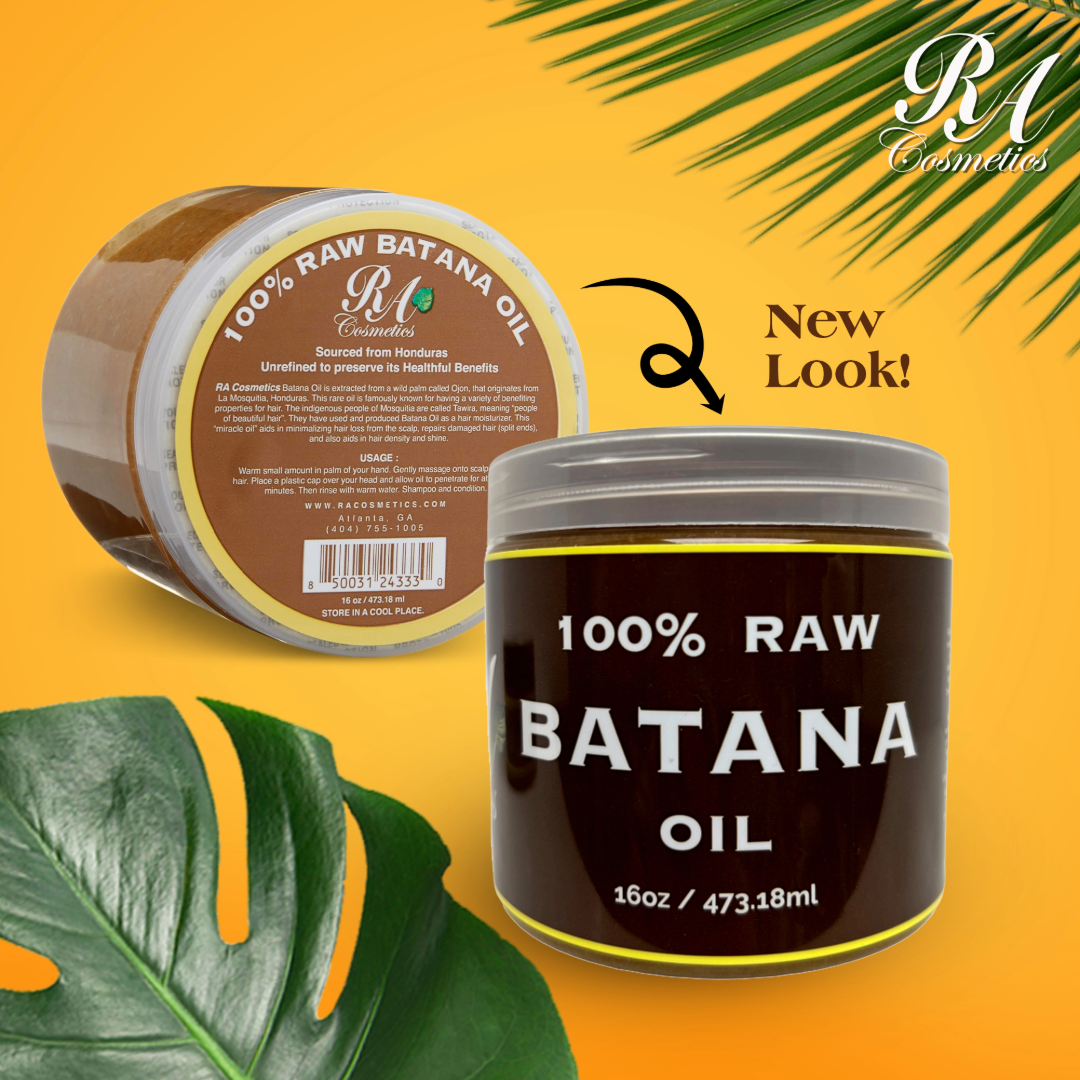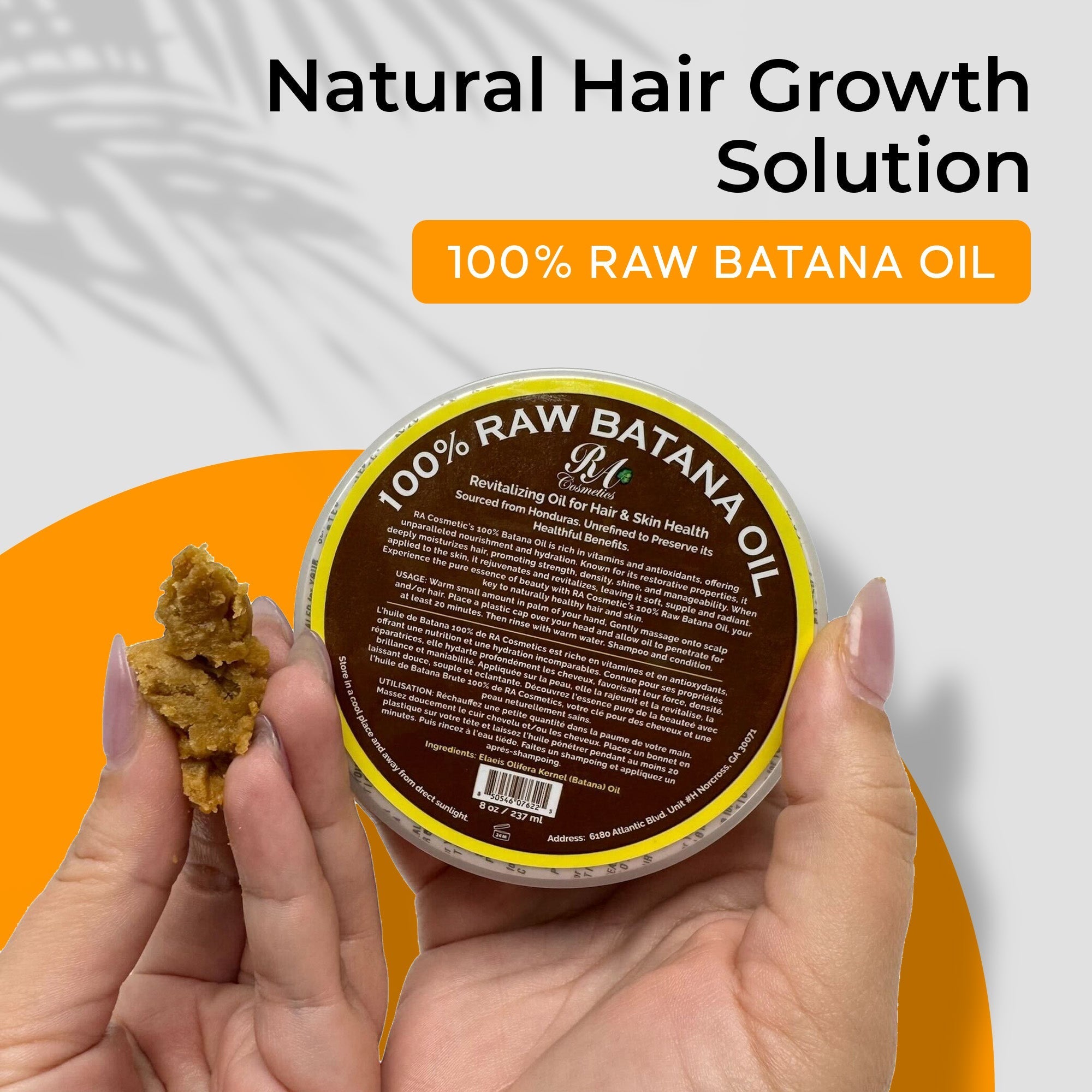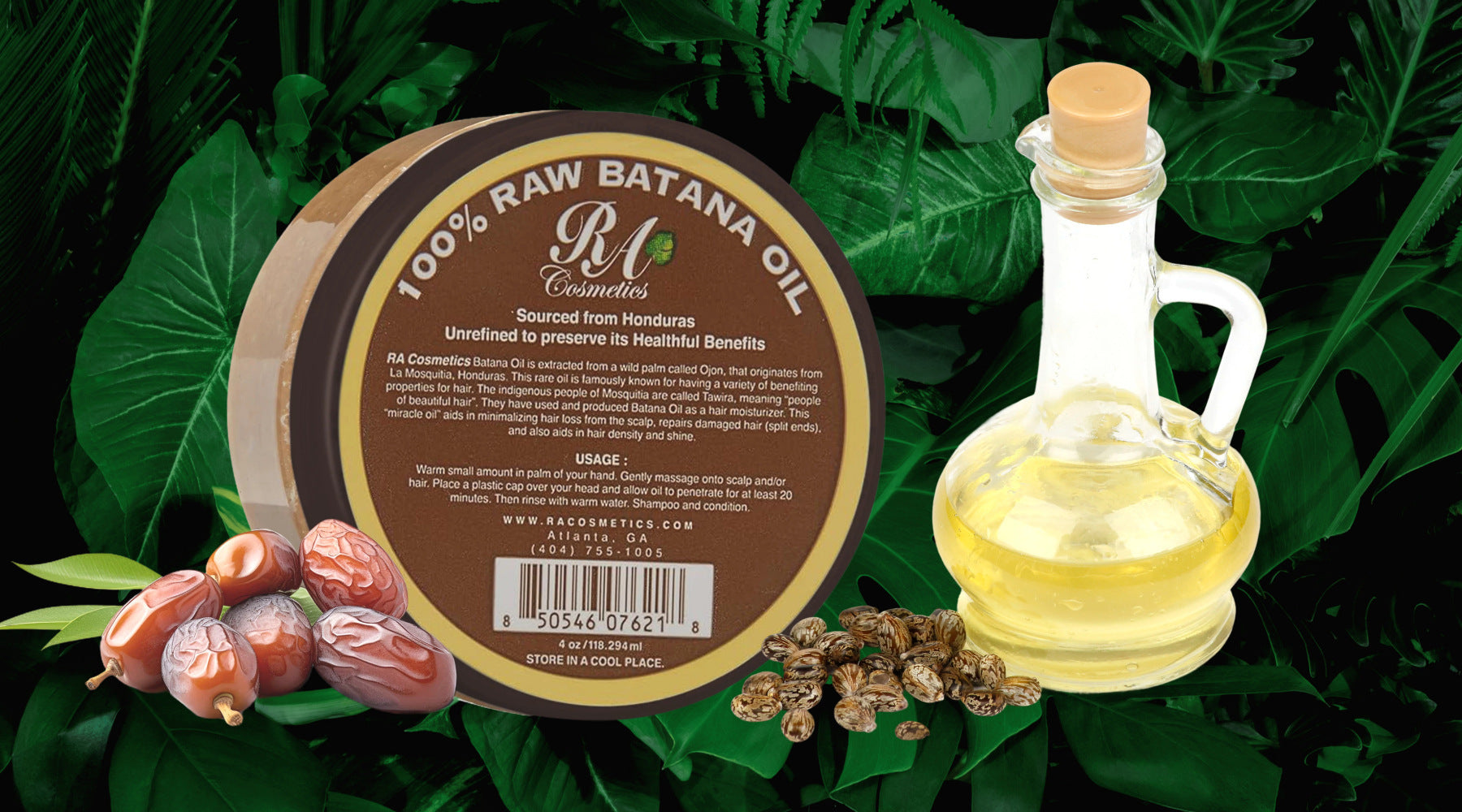
Batana Oil vs Castor Oil: Which Is Better for Your Hair and Skin?
, by RA Cosmetics Administration, 10 min reading time

, by RA Cosmetics Administration, 10 min reading time
Discover the benefits of batana oil and castor oil in our comprehensive comparison. Learn how batana oil, rich in fatty acids and antioxidants, revitalizes hair and skin, while castor oil hydrates and promotes scalp health. Explore their unique properties, extraction methods, and recommended uses for optimal results. Whether you're seeking nourishment or intense moisture, find out which oil suits your beauty routine best!
Regarding natural oils, batana oil and castor oil stand out for their unique properties and benefits. Both oils have gained popularity in the beauty and wellness industry, but they serve different purposes and offer distinct advantages. If you want to enhance your hair care routine or boost your skin's health, understanding the differences between these two oils can help you make the right choice.
Batana oil, derived from the nuts of the American palm tree, is rich in essential fatty acids and antioxidants. It's known for its ability to nourish and repair damaged hair. On the other hand, castor oil, extracted from castor beans, is famous for its thick consistency and powerful moisturizing capabilities. Whether you're considering one for hair growth or skin hydration, exploring batana oil vs castor oil will guide you in unlocking their full potential.
Batana oil comes from the nut of the American palm tree, a source of essential fatty acids and antioxidants. These properties make batana oil effective for repairing and nourishing damaged hair. Its thick, rich texture helps to moisturize and enhance luster, promoting healthier hair growth deeply.
Castor oil, on the other hand, is derived from castor beans. This oil is known for its viscous consistency and potent moisturizing abilities. Castor oil penetrates the hair shaft, providing hydration and promoting shine. Its anti-inflammatory properties contribute to scalp health, which can prevent hair loss.
Both oils offer unique benefits, so choosing them depends on your needs. Batana oil nourishes and restores hair health, while castor oil focuses on intense hydration and scalp care.
Understanding the differences between batana oil and castor oil can guide your hair and skin care choices. Each oil offers distinct features that cater to various needs.
Batana oil boasts a rich nutritional profile, including essential fatty acids like oleic and linoleic acids, along with antioxidants, which assist in nourishing and repairing hair. These components promote moisture retention and enhance hair luster.
Castor oil, on the other hand, contains ricinoleic acid, which has strong anti-inflammatory and antimicrobial properties. This unique fatty acid supports scalp health and promotes hydration within the hair shaft, making castor oil effective for taming dry or damaged hair.
|
Component |
Batana Oil |
Castor Oil |
|---|---|---|
|
Main Fatty Acid |
Oleic and Linoleic Acids |
Ricinoleic Acid |
|
Antioxidants |
High |
Moderate |
|
Anti-inflammatory Properties |
Low |
High |
|
Moisture Retention |
Excellent |
Very Good |
Batana oil is extracted through a traditional method that involves harvesting the nuts of the American palm tree, followed by a cold-press technique. This process helps to retain the oil's nutrients and overall quality, ensuring its effectiveness in hair nourishment.
Castor oil extraction also relies on cold pressing, but it's derived from castor beans. This method maintains the oil's viscosity and moisturizing capabilities, allowing it to penetrate the hair and skin deeply.
Both extraction methods play a crucial role in preserving the unique properties of each oil, impacting their efficacy in your hair care or skin regimen.
Batana oil offers numerous benefits for hair and skin health, making it a valuable addition to your beauty routine. Its rich composition enhances nourishment and hydration, promoting overall well-being.
Batana oil significantly improves hair health. Its high levels of oleic and linoleic acids deeply penetrate the hair shaft, providing essential moisture. Regular use fosters enhanced shine and softness while reducing breakage. Additionally, batana oil nourishes the scalp, supporting healthier hair growth. For the skin, batana oil acts as a powerful moisturizer, helping restore elasticity and relieve dryness. Its antioxidant properties combat free radicals, contributing to a youthful appearance.
Batana oil possesses impressive anti-inflammatory properties. These properties help soothe irritated skin and scalp, reducing redness and discomfort. By alleviating inflammation, batana oil can prevent common issues like dandruff and flaky scalp. The regular application promotes a balanced scalp environment, essential for healthy hair growth. This makes batana oil an excellent option for those experiencing scalp sensitivity or skin irritations.
Castor oil offers numerous benefits for hair and skin, primarily due to its unique composition. Understanding these advantages can enhance your beauty and wellness routine.
Castor oil acts as a potent moisturizer. Its thick, viscous texture helps hydrate the hair shaft, locking in moisture and preventing dryness. Applying castor oil regularly can lead to soft, shiny hair. Castor oil creates a protective barrier for skin that helps retain moisture, effectively combating dry patches. A few drops can soothe cracked skin or chapped lips, providing immediate relief and hydration.
Castor oil promotes hair growth through its rich ricinoleic acid content. This fatty acid enhances blood circulation to the scalp, stimulating hair follicles. Regular use can reduce hair fall and encourage the growth of thicker, healthier hair. Applying castor oil directly to the scalp can nourish hair roots and may lead to visible improvements in hair density over time.
Using batana and castor oil effectively can significantly improve hair and skin health. Both oils require proper application techniques and dosages for optimal results.
|
Oil Type |
Recommended Dosage |
Frequency |
|---|---|---|
|
Batana Oil |
1-2 tablespoons for hair and skin |
2-3 times per week |
|
Castor Oil |
1-2 teaspoons for scalp application |
1-2 times per week |
Dosages may vary depending on hair length and skin type. Always start with a small amount to assess results effectively.
Choosing between batana oil and castor oil depends on your specific beauty needs. If you're looking for deep nourishment and repair for your hair, batana oil is an excellent choice. Its rich composition can significantly enhance hair health and shine and benefit your skin.
On the other hand, if intense hydration and scalp health are your priorities, castor oil stands out. Its powerful moisturizing properties help combat dryness and promote hair growth effectively. Both oils offer unique advantages, making them valuable additions to your hair and skincare routine. Experimenting with each can help you discover which one works best for you.
Batana oil is a natural oil derived from the nuts of the American palm tree. It is rich in essential fatty acids and antioxidants, making it practical for nourishing and repairing damaged hair while deeply moisturizing the skin.
Castor oil is extracted from castor beans and is known for its thick consistency and powerful moisturizing properties. Its anti-inflammatory characteristics hydrate the hair shaft, promote shine, and support scalp health.
The primary difference lies in their nutritional makeup. Batana oil contains oleic and linoleic acids, which promote moisture retention and shine, while castor oil is rich in ricinoleic acid, which has strong anti-inflammatory and antimicrobial properties and promotes scalp health.
Batana oil helps penetrate the hair shaft deeply, enhances shine and softness, reduces breakage, and nourishes the scalp to support healthier hair growth. It also serves as a powerful moisturizer for the skin.
Castor oil hydrates the hair shaft, promoting softness and shine while locking in moisture. It can also contribute to hair growth by improving blood circulation in the scalp, stimulating hair follicles, and potentially reducing hair fall.
Batana oil can be applied to dry or damp hair, massaging it into the scalp and hair strands. It is also recommended as a moisturizer for skin to combat dryness and restore elasticity.
Castor oil should be coated onto the hair to create a protective seal on the scalp. For skin, it's best utilized as a treatment for dry areas, such as cracked skin or chapped lips.
Using 1-2 tablespoons of batana oil and 1-2 teaspoons of castor oil per application is suggested. For optimal results, you may apply them several times a week, depending on your hair and skin condition.


